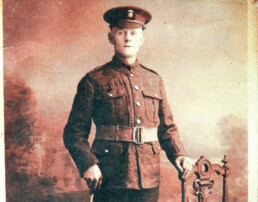John O'Donnell reviews Her Father's Daughter
Extract from ‘Postcards from the Edge’ by John O’Donnell, Poetry Ireland Review, Issue 117, December 2015
The heart of Nessa O’Mahony’s collection, Her Father’s Daughter, is a poignant and affecting series of reflections on the death of her own father. The book opens with ‘Giving Me Away’, an uneasy father and daughter road-trip which O’Mahony views initially as a sort of atonement by her father – ‘Because you had never walked me down the aisle / you sit 330 miles in the passenger seat, / watching the speed-dial, / miming brakes’ – as they head towards her ‘new start’ in Britain. However the tell-tale signs O’Mahony observes along the way reveal her father’s decline: ‘I know you’ve already /left me on this trip, / at Holyhead, at Dublin Port / before the ship embarked.’ Later we are shown the agony – for relatives – of the slow death of a loved one: ‘It has been a year / since you left / the hospital whites, / and were swalled up / by your own chair’ (‘The Long Goodbye’). Elsewhere O’Mahony looks further back; in ‘Walking Stick’ the story of her grandfather’s life is told by reference to his stick: ‘An honest thing: / ash shaft, plain, / crook smooth’ which has been ‘Crafted to bear weight, / the tonnage of trench-foot’, before being ‘Decommissioned once again / into night-watchman jobs / in Coventry, in Cricklewood.’ A case is visible on the striking cover of the same grandfather ‘kitted out as the pride / of the Munster Fusiliers’ (‘Casting Lots’), in which poem O’Mahony also hints intriguingly at the choice facing her grandfather and his brother: ‘who’d go, / who’d return / to farm and family.’ At times O’Mahony feels guilty writing about the illnesses and deaths of loved ones. In ‘Her Master’s Voice’, dedicated to the late James Simmons, she considers Simmons’s elderly dog Charlie on the day his master’s coffin is carried out: ‘He can’t know that a stranger / will come soon, tidying, / sweeping up, thieving a poem / like a starving cur grabs a bone / where she finds it.’
‘Portrait of the Artist’s Father’ is really a portrait of the arist writing about her father’s illness: ‘I trawl for metaphors, / imagine corollaries / for the fluid filling your lungs’, before acknowledging the perceived impropriety of so doing:
My page
has been empty
for months.
Forgive me
for filling it.
O’Mahony should not reproach herself: Graham Greene’s famous insight that there is ‘a splinter of ice in the heart of a writer’ came to him in hospital, as he listened to and watched from a nearby bed the tears and cries of a mother whose son had just died, thinking: ‘This is something which one day I might need.’ A writer does need a good editor, howerver, and there are a couple of curious glitches in an otherwise attractive presentation. A more ruthless editor might also have advised against the inclusion of one or two less successful pieces. At its best, though, O’Mahony’s forthright, heartfelt style is affecting, and further exploration of her family hinterland will no doubt yield up other secrets.
Uncovering a Hidden History
For much of my life, I had absolutely no idea that my grandfather, Michael McCann, had fought in the First World War. I grew up with the image of him as the archetypal Irish nationalist hero of the first decades of the twentieth century. A brooding photograph of him in Free State Army uniform and flat-topped army cap dominated the dresser in my mother’s kitchen; stories of his escapades in the War of Independence and the Civil War were an integral part of family lore. But there was no mention of the earlier conflict my grandfather was involved in, as a Lance Corporal for the Royal Munster Fusiliers. His experience, like that of so many of the hundreds of thousands of Irishmen who fought in World War I, had been quietly obliterated from the official narrative. There was no room in the nationalist mythology for any stories about those who fought for other causes.
